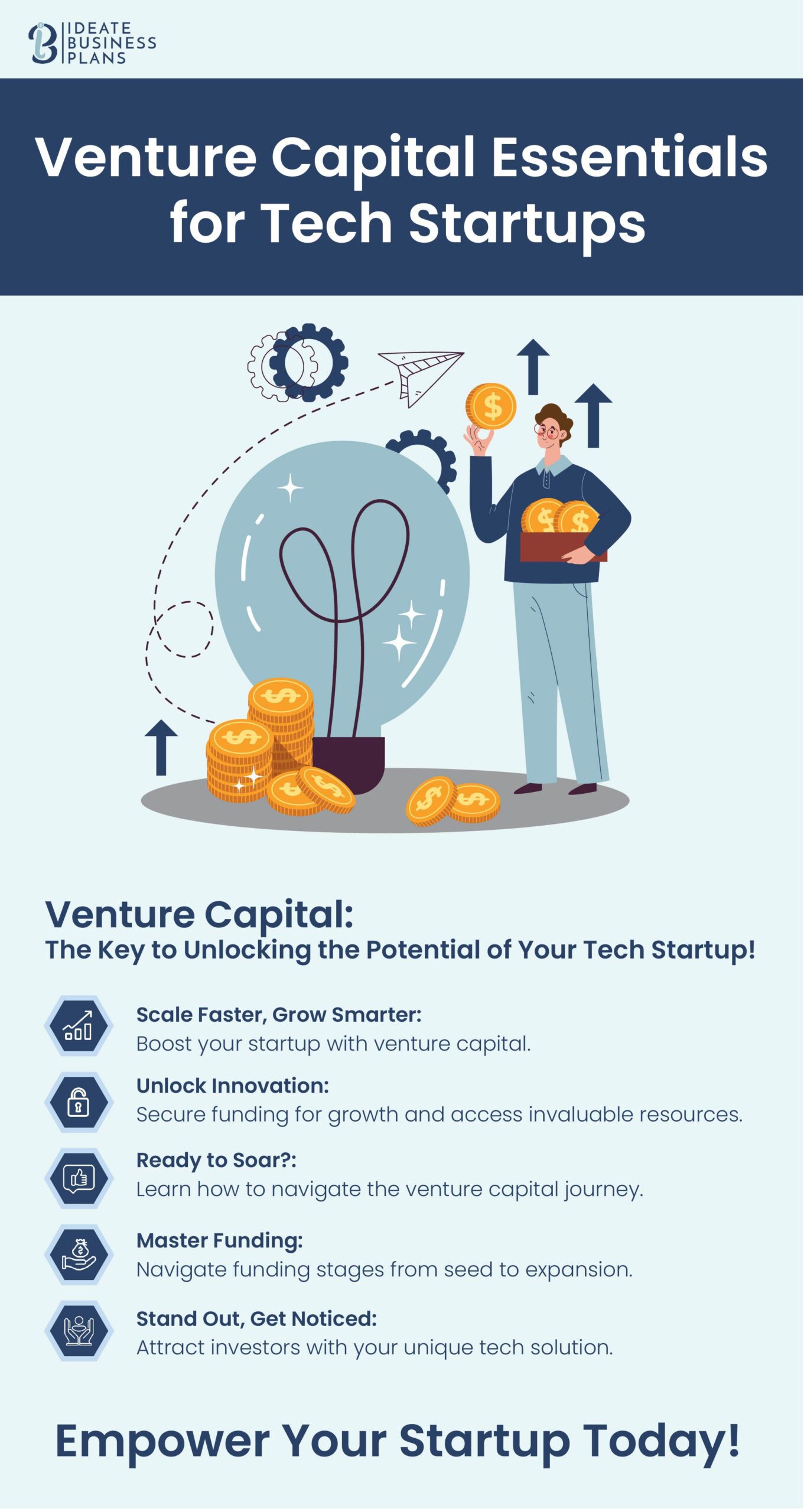The tech startup industry is driven by creativity, but it frequently takes more than just ability and enthusiasm to turn ground-breaking concepts into reality. Venture capital (VC) is the driving force behind many innovation endeavors, offering the financial boost required to grow and reach new heights. However, getting the desired VC support might sometimes feel like negotiating a challenging maze. Be at ease, daring business owner! This guide gives you the skills and information you need to approach the VC investment industry with assurance.

Venture Capital 101: A Quick Overview
In the new business, accessing venture capital is frequently necessary to raise money. It functions similarly to an investment boost from specialized corporations or individual backers that place bets on startups with significant development potential.
How It Works: Equity Exchange
Venture capital firms obtain stock in return for their money, which gives them a stake in the business. Preferred shares, which provide benefits in the event of a sale or going public, may also be awarded to them. The company offers strategic support for the duration of these investments, which typically last five to seven years.
Benefits of Venture Capital
Getting venture capital allows your firm to scale quickly. The increase in capital makes it possible to fund growth projects, which promotes rapid company expansion. Additionally, businesses get access to the venture capital firm’s invaluable resources and knowledge, which is particularly helpful for those in their early stages.
Downsides to Consider
Venture capital has drawbacks in spite of its benefits. Entrepreneurs challenge those who are adamant about holding onto complete control by giving up some of their company’s ownership. Furthermore, venture capital firms tend to favor companies with high growth potential, which makes it difficult for startups with less promising growth prospects to obtain funding.
Self-Assessment: Are You Venture Capital Ready?
It’s important to reflect on yourself before taking the VC route. Are the core characteristics of your tech startup appealing to venture capital firms? Think about the following:
Your goals
Venture capitalists (VCs) invest in businesses with the potential for rapid and substantial growth. They seek entrepreneurs aiming to expand on a large scale, not just locally. VCs focus on companies with high growth potential to secure significant returns. Typically, they expect a business to “exit” in three to 10 years, either through acquisition by a larger company or by going public. To raise venture capital for a tech startup, it’s essential to understand and align with these growth-oriented objectives.
Uniqueness Check: Does Your Product Stand Out?
Companies securing VC funding are often industry disruptors like Uber, Zillow, Square, or Facebook. To attract VC interest:
- Possess proprietary technology.
- Ensure your product or service is challenging to replicate.
- Target a sizable niche of interest to VCs.
- Adopt a unique business model.
- Establish barriers preventing competition.
- To raise venture capital for a tech startup, focus on these distinctive qualities.
Funding Needs: Venture Capital vs. Angel Investors
If you need to raise more money than $1 million, think about angel investors since venture capitalists want greater investments. Venture capitalists typically spend $2 million to $15 million or more. A tech startup looking to raise venture capital should research appropriate possibilities and be aware of the financing ranges.
Business Stage Check: Where Are You?
If your business has progressed past the seed stage, you should pursue Series A or Series B funding. Series A provides funding for companies that are prepared to grow and need money for client acquisition, product development, and recruiting. Successful businesses looking to quickly expand into new goods, services, or markets might consider Series B funding. Determine the right fundraising stage for your company before trying to obtain venture capital for a digital startup.
Surrendering Control: Venture Capital Considerations
There is a trade-off in venture capital: financing is exchanged for equity. As minority shareholders, VCs become your subordinates. They may become managers or join your board, which would give them decision-making power. Plan vetoes or CEO replacements are also possible. If this worries you, VC might not be the best option. If a tech startup wants to obtain venture funding, consider the consequences of ceding control.
Strategic Planning for Venture Capital Success
Although VCs have a lot of power, they won’t provide you step-by-step instructions. Prepare a clear expansion strategy that you can implement as soon as you have funding. VCs are able to discern hype, so make sure it’s based on facts. Encouragingly back up each assertion in your strategy and be ready for in-depth questions about figures, important metrics, and assumptions. Clearly state the intended use of the invested funds as well as the anticipated results, such as increased income and clientele. Create a comprehensive and practical business plan in order to attract venture money for your tech startup.
A Strong Founding Team
VCs carefully consider the qualifications, track record, and expertise of your management team. They want proof that your group can lead successfully in the face of obstacles posed by fast development. Before contacting VCs, strengthen your team if any important people are absent, if there are weak linkages, or if there are frequent arguments. In your company strategy, make it clear if a venture capital investment is necessary to improve your management team. A tech startup that wants to obtain venture funding should concentrate on assembling a strong and competent management team.
Venture Capital Readiness: Preparing your tech startup for investment
To ensure success in securing the desired funding, it’s crucial for your startup to be prepared to attract venture capitalists. Here are key steps to take:
Conduct thorough research
- Understand the venture capital process, including different types of funding and criteria for investment.
- Familiarize yourself with the stages of funding and what investors look in a startup.
Strategic Business Planning
- Emphasize how important strategic business planning is to obtaining venture capital investment.
- In order to successfully express your startup’s vision and potential to investors, emphasize the importance of clarity and conciseness in your business plan.
- Emphasize how crucial it is to include in the strategy a thorough summary of your target market, business concept, and competitive environment.
- Describe the importance of providing thorough financial predictions to show your startup’s potential for growth and profitability.
- Showcase how a solid business plan may be an effective tool for drawing in investors and obtaining the funds required to acquire venture capital for your tech startup.
Forming an Exceptional Team
- Draw attention to how important the startup team’s makeup is to venture investors.
- Emphasize the significance of showcasing a strong team with the necessary expertise and experience needed to carry out the company strategy.
- Stress how important it is to demonstrate the team’s capacity to carry out the suggested business strategy.
- Discuss the significance of putting together a team with complementary knowledge and abilities to handle different facets of the startup’s operations.
- Describe how a good team gives investors confidence and raises the possibility that the tech startup will receive venture capital investment.
Mastering Financials
- Emphasize to prospective investors the significance of exhibiting a deep comprehension of financial indicators.
- Stress the importance of understanding and controlling the burn rate, which is a reflection of the rate of expenditure.
- Talk about the importance of evaluating the runway and the amount of time left to turn a profit or get more funding.
- Describe how demonstrating a strong understanding of finances gives venture capitalists confidence and increases the possibility of receiving investment.
- Explain how using financial analytics to support strategic planning and decision-making helps startups maximize their chances of getting venture capital funding.
Market Clarity
- Insist on proving that you have a thorough grasp of the target market and that you have a solid go-to-market plan.
Be prepared for Inquiry
- Emphasize how important it is to prepare for and respond to difficult questions from venture investors while conducting due diligence.
- Talk about how important it is to provide thorough answers to inquiries about the business concept, market potential, rivalry, strategy, and financial projections.
- Describe how being well-prepared improves the tech startup’s chances of getting venture capital investment.
- Showcase how putting these tactics into practice puts the business on a path to draw in venture capital interest and funding, ultimately promoting expansion and success.
Getting Around the Venture Capital Process: Important Phases and Funding Perspectives
Getting venture capital (VC) investment is frequently essential for development and success in today’s startup environment. The venture capital journey is broken down into the following stages and what investors look for:
- Bootstrapping and Pre-Seeding
- The first stage was devoted to creating prototypes and determining the business’s profitability.
- Reliance on personal resources, relationships, and early-stage capital for financing.
- During this stage, it’s critical to handle legal concerns and improve business models.
- Seed Stage Funding
- Go on to showcase the product’s feasibility and sales potential.
- Funding for the creation of a business strategy, team building, and market research.
- Angel investors, friends, family, and entrepreneurs are examples of seed-stage investors.
- Series A Funding
- The phase of expansion where revenue creation and product-market fit are prioritized.
- Requirement for a strong business plan and proof of a steady stream of income.
- Startups with good leadership and room for development are what investors seek out.
- Series B Funding
- A significant amount of funds are needed for operations and market expansion during the scaling stage.
- Pay attention to commercial viability and performance indicators.
- Family offices, corporate VCs, and venture capitalists are examples of investors.
- Expansion and Growth (Series C and Beyond)
- Sustained growth with a steady income stream and aspirations for global expansion.
- Participation of hedge funds, private equity firms, and late-stage investors.
- Develop new goods, break into untapped markets, and maintain steady profitability.
- Mezzanine Stage and Liquidity Events
- Chance to reach public markets for companies and to achieve rewards for investors.
- For quicker capital raising, other financing solutions such as special purpose acquisition corporations (SPACs) should be taken into account.
Startups may manage the fundraising process more skillfully and improve their chances of obtaining the funds required to support development by being aware of the stages of venture capital and what investors look for.



